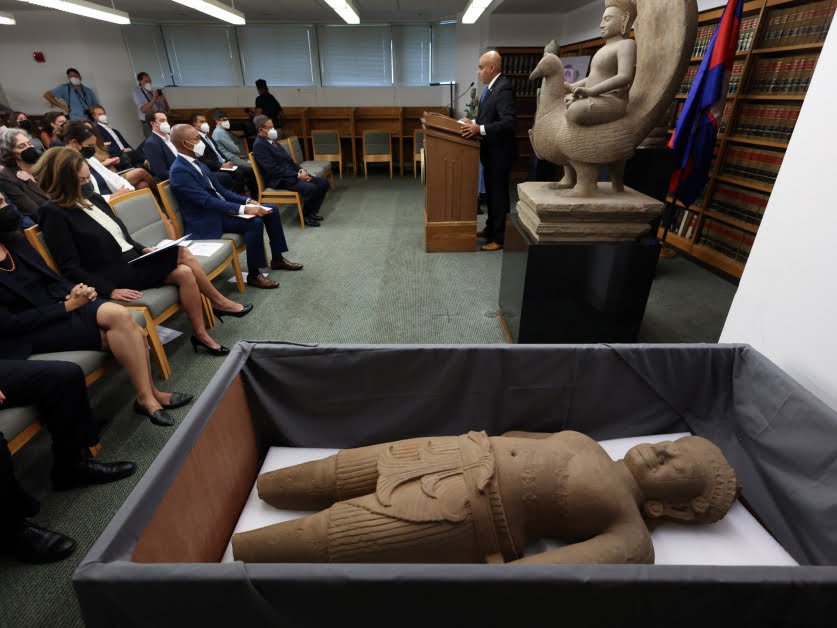Addressing the Global Issue of Cultural Heritage Theft and Antiquities Trafficking
The United States has been under increasing scrutiny in recent years to tackle the problem of cultural heritage theft and the illicit trafficking of antiquities. This has sparked a renewed emphasis on repatriating stolen artifacts to their countries of origin, particularly in Cambodia and Indonesia. The return of these valuable artifacts signifies a crucial step in rectifying historical injustices and preserving the cultural heritage of these nations. However, the pressing question remains: what further measures can be implemented to prevent future theft and safeguard cultural treasures worldwide?
Antiquities Trafficking Scandal Unveiled in New York
In a recent revelation, the district attorney in New York City uncovered a scandal involving two prominent art dealers engaged in the illegal trafficking of antiquities worth a staggering $3 million. Prosecutors have successfully repatriated 30 looted artifacts back to Cambodia and Indonesia, which were unlawfully obtained and circulated by American networks of antiquities sellers and traffickers.
The returned antiquities, including a bronze statue of the Hindu deity Shiva stolen from Cambodia and a stone bas-relief sculpture depicting royal figures from the Majapahit empire in Indonesia, hold significant cultural value. The district attorney, Alvin Bragg, explicitly named American art dealers Subhash Kapoor and Nancy Wiener as key players in the illicit trafficking of these antiquities.
Subhash Kapoor, an American-Indian art dealer, was implicated in orchestrating a trafficking network that specialized in stolen Southeast Asian artifacts, which were later displayed for sale in his Manhattan gallery. Kapoor’s activities were scrutinized in a long-standing United States justice investigation dubbed “Hidden Idol,” culminating in his arrest in Germany in 2011 and subsequent extradition to India, where he was convicted and sentenced to 13 years in prison.
Ongoing Efforts to Combat Antiquities Trafficking
New York has emerged as a central hub for the trafficking of stolen and looted antiquities, with numerous artifacts being seized from museums and private collectors in recent years, including the prestigious Metropolitan Museum of Art. District Attorney Bragg reaffirmed the commitment to investigating and dismantling the extensive trafficking networks that target Southeast Asian antiquities, emphasizing the need for sustained efforts in combating this illicit trade.
Nancy Wiener, who was previously convicted in 2021 for trafficking in stolen artworks, attempted to sell the bronze Shiva statue but ultimately donated it to the Denver Museum of Art in Colorado in 2007. However, the artifact was later seized by the New York courts in 2023, highlighting the continued challenges in addressing antiquities trafficking.
Celebrating the Repatriation of Cultural Heritage
The repatriation of these looted antiquities to Cambodia and Indonesia has been met with praise and gratitude from the respective nations’ representatives in the United States. Cambodia’s ambassador, Keo Chhea, hailed the return of the artifacts as a symbol of renewed commitment to safeguarding shared heritage, ensuring the preservation of collective history for future generations. Similarly, Indonesia’s Consul General Winanto Adi expressed appreciation for District Attorney Bragg’s efforts, describing them as a valuable gift as the two countries celebrated the seventy-fifth anniversary of their diplomatic relations.
the repatriation of stolen antiquities and the prosecution of individuals involved in their trafficking underscore the importance of international cooperation in combatting cultural heritage theft. By upholding the principles of cultural preservation and restitution, nations can work together to protect and honor their rich historical legacies for generations to come.


